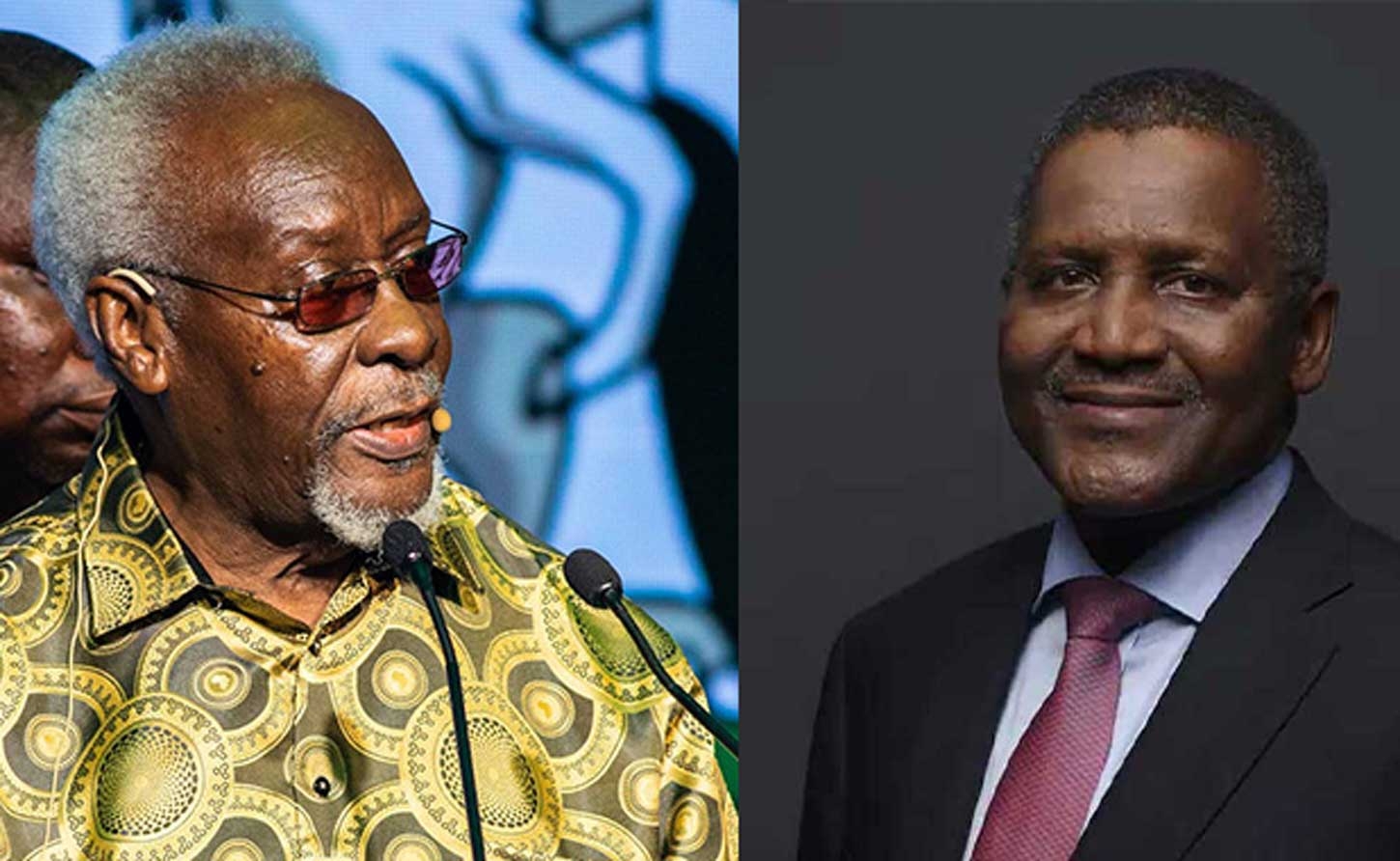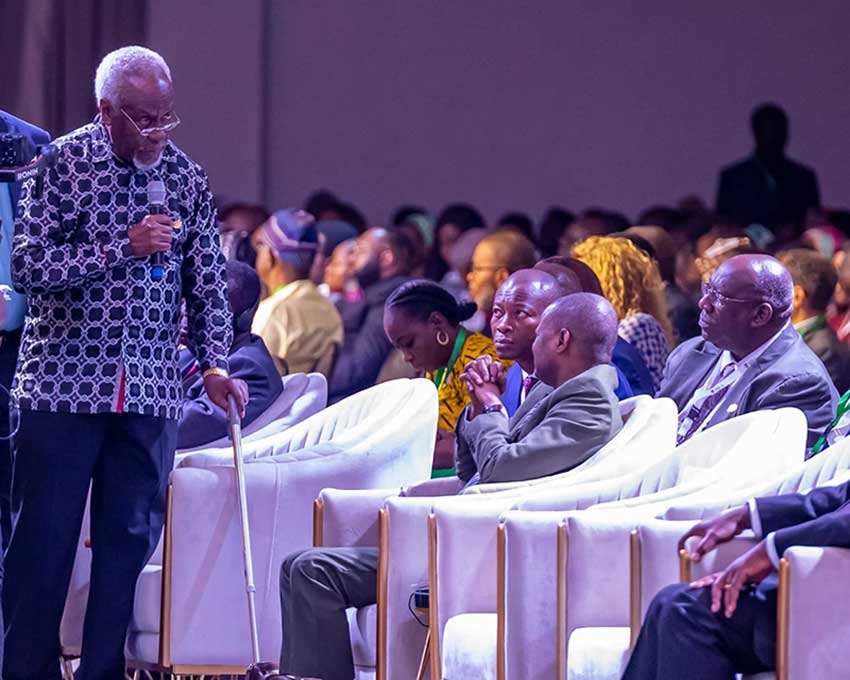AFRICA | Two Titans, One Message: Dangote and Patterson Call for Economic Revolution Across Continents

ABUJA, Nigeria June 27, 2025 - The message was as blunt as it was revolutionary. Standing before Africa's financial elite at the Afreximbank Annual Meetings, billionaire industrialist Aliko Dangote threw down a gauntlet that reverberated across the continent: "If it's America First, then it must be Africa First."
Hours later, another titan took the stage with equally urgent rhetoric. Former Jamaican Prime Minister P.J. Patterson, delivering the keynote at a high-level plenary on Africa-Caribbean cooperation, warned that "the time for symbolic talk is over and the moment for bold, united action is now."
Together, their voices formed a crescendo calling for nothing short of economic revolution across two continents linked by history but divided by an ocean.
In a continent that ships out crude oil and ships in refined fuel, exports cocoa beans and imports chocolate, Dangote's words weren't just rhetoric—they were a roadmap backed by his own industrial conquests.
The man who transformed Nigeria's cement production from a modest 1.9 million tonnes to a staggering 60 million tonnes wasn't speaking in hypotheticals.
His $20 billion refinery, now humming at 85% capacity and poised to reach full production within 30 days, processes 650,000 barrels daily—enough to make Nigeria self-sufficient while supplying neighboring West African nations.
Patterson's call carried equal weight, drawn from decades navigating the global development financing system that he declared had reached a "breaking point." "We must honour the past by claiming the future," Patterson declared. "

The convergence of these two voices in Abuja wasn't coincidental. Both leaders diagnosed the same fundamental problem: over-reliance on external powers has left Africa and the Caribbean as passive consumers rather than active producers in the global economy.
Dangote's industrial empire and Patterson's diplomatic legacy represent different paths toward the same destination—economic sovereignty.
Dangote's wide-ranging address cut straight to Africa's economic jugular. The continent, he argued, must stop being the world's raw material supplier and start building its own value chains.
"Africa Champions should understand that we are the only people who would make Africa great, and nobody would do that for us" -Aliko Dangote
— Nairametrics (@Nairametrics) June 27, 2025
🔗 Join the conversation hosted by @afreximbank via the link below
📍 Live from Abujahttps://t.co/EGTM3wCpou#AAM2025 pic.twitter.com/83EI3LHnRt
His diagnosis was surgical in its precision: over-reliance on foreign capital isn't just unsustainable—it's economically suicidal. "If I'm not investing at home, how can I expect anyone else to?" he challenged, announcing plans to list his fertiliser and refinery businesses.
Patterson's vision extended beyond African borders to embrace the Caribbean diaspora. "We are now separated by the Atlantic Ocean, but we should never forget that in the age of Gondwana, we were all part of a single supercontinent," he told delegates, invoking geological history to underscore cultural and economic bonds.
His call for immediate deepening of Africa-Caribbean ties through the Afreximbank Caribbean Initiative, launched in 2022, represents a blueprint for South-South cooperation.
Yet both leaders didn't sugar-coat the obstacles. Dangote acknowledged chronic power shortages and shifting policy environments that have frustrated continental progress for decades.
Patterson stressed the urgency of action amid rising global protectionism and shifting international power dynamics. However, they reserved special praise for institutions like Afreximbank, with Dangote declaring, "Without our bankers, led by Afreximbank, it would have been impossible."
The numbers back their urgency. Africa exports 4.7 million barrels of oil daily while importing 2.8 million barrels of refined products, hemorrhaging $100 billion annually. Nigeria alone has received $52 billion in trade and development finance from Afreximbank, making it the bank's largest beneficiary. Meanwhile, Afreximbank's 2025 African Trade Report shows the continent's economy growing at 3.2% despite global headwinds.
Dangote's most provocative proposal involved dramatically scaling Africa's financial architecture, calling for at least ten institutions modeled after Afreximbank.
Patterson complemented this with his AI-powered collaboration between his institute and Afreximbank, designed to enhance education and technological innovation across both regions. Both men shared the philosophy: "Think big, then grow big."
Patterson challenged delegates to move beyond economics to cultural emancipation: "Our children must know they are heirs to ancient civilisations—masters of medicine, mathematics, and music before Europe even discovered its own continents." Dangote offered his own reframing of corruption: "Corruption exists everywhere. The issue is when stolen money is taken out of Africa instead of being reinvested here."
As delegates departed Abuja, the twin challenges from Dangote and Patterson lingered in Nigeria's humid air. Africa and the Caribbean don't need charity, they insisted. They need bold leadership, visionary investment, and institutions that reflect continental ambition. Most importantly, they need people willing to build bridges across the Atlantic—economic, cultural, and technological.
In their shared vision, the future won't come from foreign benevolence or international aid packages. It will come from African and Caribbean hands, capital, and determination. The refinery towers rising from Lagos swampland and the AI hubs planned between Kingston and Lagos stand as monuments to that possibility—industrial and digital cathedrals in a global South renaissance.
-30-
